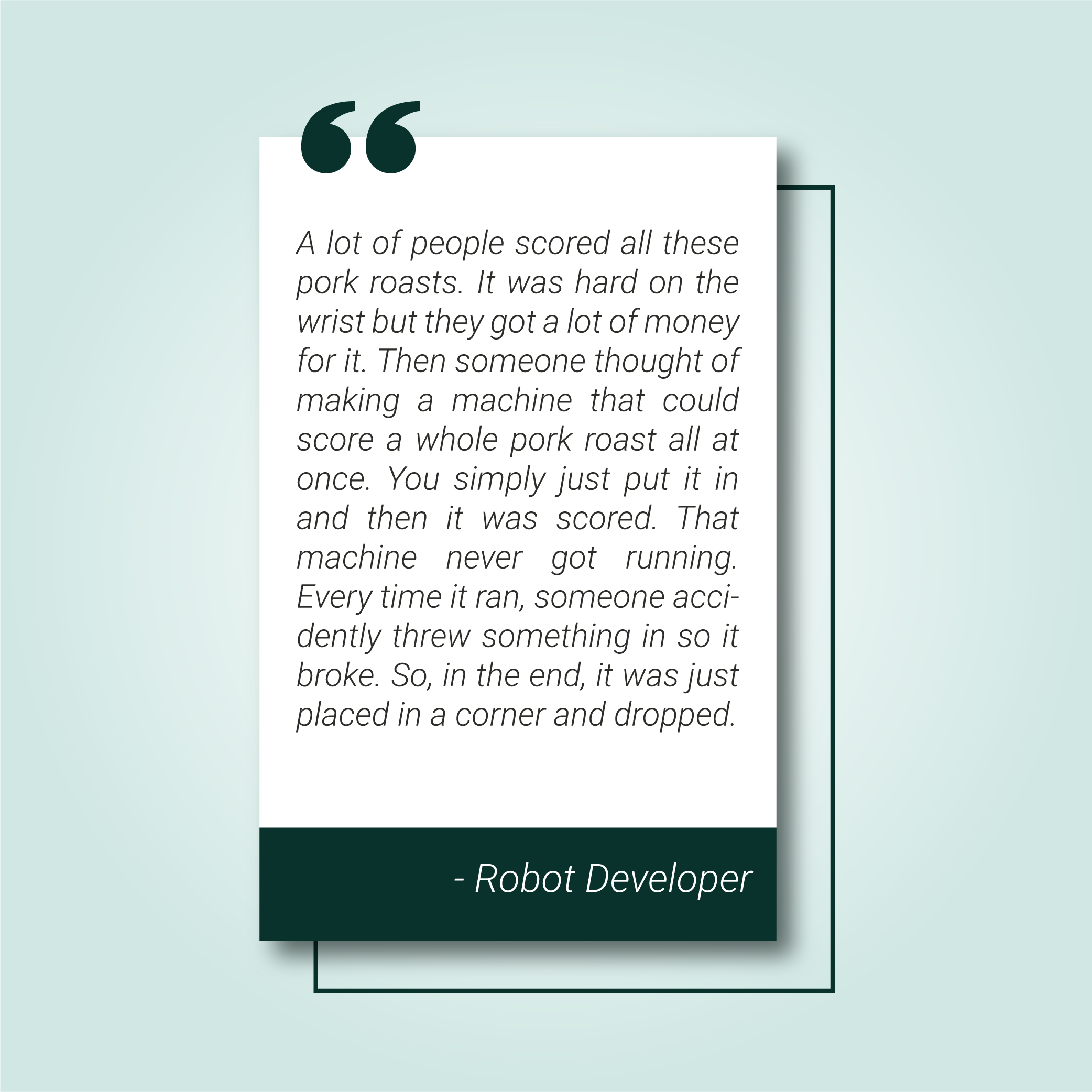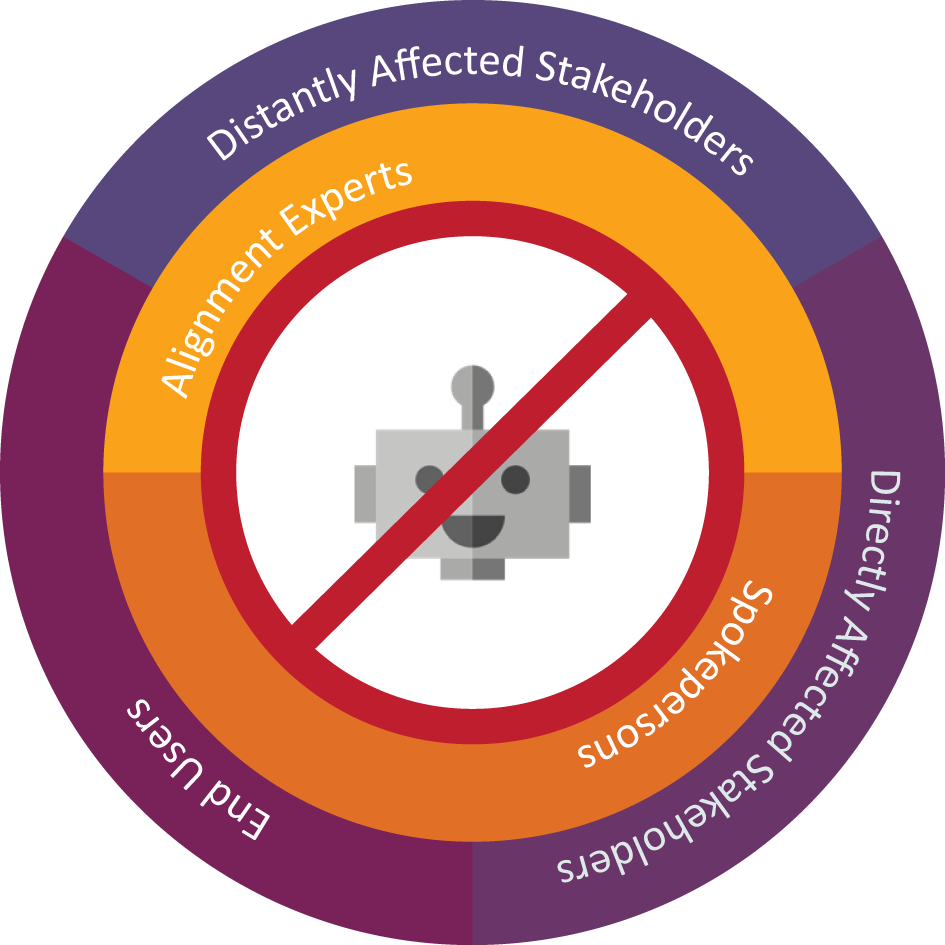Meaningful Work
What is the impact of robotization in work organization?

What is a meaningful work life? How will automation and robots influence what is meaningful about work? In answering these questions in robot development, can we increase acceptance and avoid robots being sabotaged or abandoned?
We have come to question a self-evident assumption of labor as toil and trouble from which humans are happy to be liberated. What is perceived as menial and repetitive labor by some can be seen as meaningful, creative, and productive work by others.
Here, we present an analysis of our data on the laboring society.


Human Proximity Model
The meaningfulness of work can be at odds with robots and automation processes. Technological determinism shapes views on automation and the worker for both the workers, owners of enterprises and robot makers.
Perceptions of Labor
Our definition of automation is the mechanization of human labor, both inherent and productive. Automation of labor is achieved at different levels, full automation implies that the human is entirely displaced from the work, while partial automation keeps some humans in the workflow, where the robot performs particular tasks. Historically, both partial and full automation have transformed work life, sometimes significantly for the better and sometimes to the detriment of particular persons.
Sometimes, issues of replacement and other negative effects of robotization are balanced with the positive effects or goals of automation. In particular, many members of the robotics community are caught up in a particular rhetoric around employment: Robots create more jobs than they replace. Indeed, robotization is likely to eliminate particular occupations or sectors while opening for brand new or transformed sectors. But what happens to workers in these transitions?
We have identified two distinct ways of thinking about the human that permeate these conversations about relief and replacement: the human worker as a labor source, and the worker as a whole person.
Deterministic Perspectives: Human as a Labor Source
When the human is equated with the machine as a source of labor, reduced in complexity and measured only as means of production, it becomes easy to imagine a machine replacing the human. From this line of thinking comes an attitude of technological determinism, where the reasons for automation are so self-evident that technological displacement becomes inevitable.
Skeptical Perspectives: Human as a Whole Person
A barrier to automation is the immaturity of existing robotic technologies, and a skepticism toward the ability of emerging technologies to meet the qualities of the manual worker. When looking beyond the worker's value as a source of labor and instead thought of their whole value, the human worker was not so easily automated, particularly in terms of social skills, complex work activities, or decision-making.
Scroll the bar to see the differences.
Robot Maker's Perceptions of Relief
Robot makers want to relieve humans of tedious and heavy work. Yet, this is rarely done by approaching end users directly, to inquire about what they think would be helpful in their day-to-day work lives. Instead, such perceptions are developed in the inner circles of the robotic bubble, where intermediaries function as spokespersons for users. This means the robots may fail to address the problems they set out to solve.
Giving Voice
Click on to listen to the Affected Stakeholder. Click on the arrows to navigate. You can expand the content to full screen by clicking on the bottom right corner.

What robot makers perceive as tedious, some workers perceive as meaningful. Some workers are skeptical of relief, while others are simply content with the type of work they do and the conditions under which they do it.
Besides an income, service workers are seeking a meaningful work life, a job that provides them with:
- Acomplishment
- Human Connection
- A Good Team
- Respect
Click on the tabs below to learn more about the aspects related to work affected by the transformation of work by robotization.
Collegiality is a value tied to one’s identity and role within a community of practice. Colleagues bring to work a sharing of experience, expertise, commiseration, history. Colleagues are particularly important to manual labor which often requires the close cooperation of a team or a pair because of the sheer physicality of manual labor. The loss of a colleague would entail more than a change in work processes, but a disruption of the social life in the workplace.
Pride in work is a value tied to learning and identity. Many workers express pride with regard to the skills they have developed in their work. They may have a particular technique for installing doors that they have learned from hands-on experience. Or they may be more effective in harvesting fruit or cleaning the bed handles in a hospital, because of their contextual knowledge of the work task. Or, they may take pride in the care and precision they put into their ironing for clients in service work. When machines are inserted into work processes, some level of control over this technique, efficacy, precision, or care is taken from them.
Closely tied to pride, professional achievement can provide a person with a new identity. People tend to attach an identity to their jobs. An identity built on achievement may also include some sort of pride, status, or value that comes from earning a particular position or salary. Achievement can also be a way of distinguishing oneself from one’s peers. If a person’s particular skills are changed, their work made less complex, or even replaced by a basic unemployment income, the measures by which their identity is forged may be altered and thus the person may experience a loss of identity.
The consequences of widespread use of technologies might include a collective loss of skill (navigation by charts) or even a change in our physiology (weaker hands). On a smaller scale, the worker might lose interest in the remaining aspects of the task.
- Work: Remunerated human labor, both as means unto itself and as means of production.
- Automation: The mechanization of human labor, both inherent and productive.
- Transformation of Work: The experienced changes to work and workers as a result of automation and digitalization.
- Technology Resistance: Opposition to an implemented technology, whether by passive non-use, active misuse, or deliberate sabotage.
- Technology Aprehension: An initial reluctance to use a new technology, tied to a lack of experience or lack of information.
Key Concepts
Reflection Points
- To what extent do you think humans can be automated and standarized?
- When should engineers solve societal problems?
- Which of your work tasks, if automated, would affect your fulfilment at work?
- When is relief more important than efficiency?
Concluding Remarks on Meaningful Work
Robot makers have an opportunity and a responsibility to shape future work towards continued meaningfulness through their automation decisions, by protecting the values workers hold in relation to work. If robots are to be a part of our future work lives, it is essential that we ground the development and implementation of these machines in a firm understanding of the work and the workers where these robots will be situated. A closer proximity between robot makers and affected stakeholders could provide such understandings.
If you found this interesting, read more here:
Click here to Download Chapter 10: Meaningful Work
Download
If you enjoyed reading about Meaningful Work, you may also like:
By going over each icon with the mouse you will get a brief description of the corresponding topic.